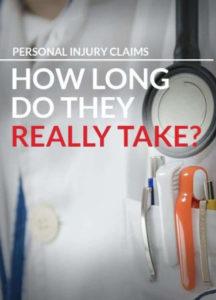
From car crashes to slip-and-fall accidents, millions of people sustain injuries every year. Recovering from them often requires expensive medical treatment, long-term therapy, and time off work. These expenses can be tough to handle without assistance.
If another party’s negligence caused your injuries, you may be entitled to compensation. By working with a personal injury attorney, you can increase your chances of fair damage recovery.
The legal team from Morris Bart can explain how to get compensation after a personal injury, discuss your options, and help you get the money you deserve.
Knowing Who Is Responsible
When it comes to personal injuries, several parties may be involved. To prove negligence and obtain compensation, you need to discover who is responsible.
For example, in a car accident, the responsible party can be another driver, driver’s employer, car manufacturer, or even the government. In a malpractice lawsuit, you could be suing the hospital, the doctor, the nurse, or the anesthesiologist.
Understanding who is liable for your injuries can be tricky. The fault isn’t always straightforward. You may need an attorney’s assistance to investigate the case and uncover all responsible parties.
For a free legal consultation, call 800-537-8185
Proving Negligence
To get compensation for your personal injury, you need to prove that the at-fault party demonstrated negligence. Doing this involves four steps:
- Proving legal duty of care – the party you are trying to recover damages from should have a legal duty of care to you. For example, a property owner has a legal duty to keep visitors safe or warn them about possible dangers.
- Demonstrating the breach of duty – to prove negligence, you need to show that the defendant breached the legal duty of care. For example, if the store owner failed to put the “wet floor” sign around a spill, this means they didn’t give you a proper warning about possible dangers.
- Establishing causation – you would have to prove that the defendant’s breach of duty caused your injuries. For example, the owner didn’t put up the “wet floor” sign, you didn’t see the spill, slipped, fell, and broke your leg.
- Showing damage – you need to show that the injuries you sustained led to damages. For example, if you slipped, fell, and broke your leg, you need to prove that you received medical treatment for the broken leg and had to miss work because of it.
Even if negligence seems obvious, it may not always be straightforward. Proving it requires a professional approach to gathering evidence, speaking to eyewitnesses, consulting expert witnesses, and much more.
Without a personal injury attorney on your side, you may have a hard time proving negligence. Especially if the defendant hires a team of lawyers to counter your arguments.
Comparative Negligence
Comparative negligence laws dictate whether you still have the right to recover damages if you are partially responsible for the accident.
For example, driver A runs a stop sign and hits driver B who makes an illegal U-turn. Both drivers are responsible for the accident. The judge may decide that driver A is 60% responsible while driver B is 40% responsible.
Each state has its own negligence laws. In most cases, drivers can recover damages in proportion to their responsibility but only if their fault doesn’t exceed 50%.
With this law in place, the defendant’s legal team will do everything possible to maximize your fault. Without a personal injury attorney in your corner, you may end up with minimal compensation.
Click to contact our personal injury lawyers today
Exploring Your Compensation Options
To recover compensation for your personal injuries, you can:
- File a claim with the defendant’s insurance company.
- File a lawsuit against the at-fault party directly.
In both cases, you may want to consider legal assistance. Whether you are negotiating with an insurance company or presenting your case in court, the lack of legal experience can be a deciding factor.
By choosing to work with a personal injury attorney, you don’t just maximize your chances of obtaining compensation. You gain valuable time to focus on treating your injuries or grieving the loss of a loved one.
Checking the Statute of Limitations
Statute of limitations dictates the time you have to file a lawsuit against the at-fault party. This period depends on several factors:
- The type of personal injury
- The state you live in
- The age of the plaintiff
- The location of the defendant
For example, in Louisiana, the statute of limitation for personal injury cases is one year. In Alabama, it’s two years. Meanwhile, in Arkansas and Mississippi, it’s three years. The clock usually starts running on the date of the incident.
If you decide to file a personal injury lawsuit after the deadline, you could still recover damages. In each state, there are specific exceptions to the statute. To learn if one of them applies to you, consider consulting a personal injury attorney.
Hiring a Personal Injury Attorney
If you want to improve your chances of recovering damages for personal injuries, you may want to hire an attorney. A personal injury lawyer can:
- Collect all the necessary evidence
- Conduct an independent investigation
- Speak with eyewitnesses
- Find the right expert witnesses
- Negotiate with the defendant’s insurance company
- Represent you in court
- Provide valuable legal advice
- Support you throughout the case
It’s important to remember that even a straightforward personal injury case comes with specific nuances. By trying to handle it on your own, you risk minimizing the payout.
Call an Experienced Personal Injury Lawyer Today
If you’ve sustained injuries or lost a loved one due to someone else’s negligence, you may be able to recover damages. To find out what to do and how to do it right, you may want to speak to an attorney. Failing to get legal assistance could lessen your chances of winning the case.
At Morris Bart, we are always ready to help you get the compensation you deserve. Call us for a free consultation at any convenient time.
Questions?Call 800-537-8185
to find a Morris Bart office near you.





